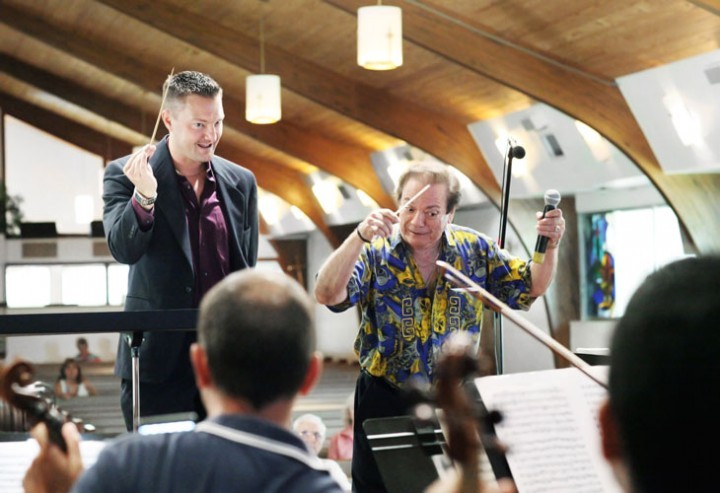
VERO BEACH — It’s a good thing music is the universal language. For an hour just before last week’s Summerfest concert, Symphony of the Americas conductor John Brooks-Bruzzese gave up his place at the podium to the locals: a trio of Vero music directors who got to try their hand at orchestra conducting.
The esteemed conductor of the Ft. Lauderdale-based orchestra instead served as interpreter for an international group of musicians touring with him this summer.
The language skills of the Panama-born Brooks-Bruzzese were called upon when he led a master class in conducting.
He not only called out page numbers in Italian and translated musical idioms, he interpreted the gestures of the conductors and the responses of the musicians.
The selections played, movements of a C.P.E. Bach symphony, were part of the Summerfest Concert later that evening at Christ by the Sea Methodist Church.
“The master class was my idea,” said Marcos Flores, who runs the music program at the island church.
Flores says most master classes are for strings, vocal soloists and piano students. But they exist for conductors too, focusing on many of the same points as a conducting course in college.
“In conducting, the instrument is the body,” he says.
Getting that instrument to produce sound requires having musicians around to play, of course. But access to an orchestra is a huge challenge.
“This is a famous conductor that we have the privilege of having in our church,” says Flores. “These people who conduct concert choirs, student orchestras or jazz ensembles rarely have the chance to conduct a professional orchestra. So why not provide a master class for conductors?”
For an extra $750 on top of the $3,000 that a sponsor gave for the concert, the county’s Cultural Council, the event’s organizer, persuaded Brooks-Bruzzece to stage the class.
Typically, conductors practice with sound tracks, videotaping themselves or looking in a mirror “to see if you’re communicating the musical idea with the ensemble,” Flores says.
At the master class, though, there is live feedback.
“The good musician is always a good source of information,” says Brooks-Bruzzese, who says his orchestra has held master classes before “at a very high level,” with “great conductors and the best of the applicants.”
Last week, in 20-minute segments, Vero’s conductors took turns with the chamber group, running through a movement, starting and stopping, comparing notes, and occasionally sharing a “bravo!”’ before a handful of curious listeners seated in the church’s front pews.
An audience of around 70 came later for the concert.
“We’re looking for how he handles the baton,” explained Brooks-Bruzzese. “We’re looking for clearness of his beat, to make sure that his style is clear so they can follow. We want to see that the conductor understands his music, and discusses the phrase dynamics with his baton and the style of the music with his motion.”
And there is another quality apart from musicianship, he says.
“Musicians are looking to see that the person in front of them is a leader, not a follower.”
The musicians also expect a conductor to be well-informed.
“You have to be somewhat of a musicologist. You have to know the composers and the era and who he worked with.”
A couple of hours before the real concert, with the musicians took their places still in their travel clothes, the same tropical print shirts and khaki shorts they wore driving up from Broward County, where the Symphony of the Americas is based.
The 20 musicians included a few from the Fort Lauderdale group, but the majority was from the Mission Chamber Orchestra of Rome, formed four years ago.
They gamely participated in the give-and-take, playing the pieces then offering input.
Their own director, Lorenzo Turchi-Floris, also offered help, with a bit of a language struggle and considerable gesturing.
Turchi-Floris, who would later play a solo of his own composition in the concert, brought the Rome group together after a stint with the Mont Blanc Symphony.
Chiefly, though, it was Brooks- Bruzzese who nudged the local conductors with tips and prompts delivered sotto voce so that the orchestra wouldn’t know what to expect.
Only once did the guidance turn brusque, as a cliché gesture grated on Brooks-Bruzzese’s nerves.
“Don’t tap the baton. I can’t stand that,” Brooks-Bruzzese barked when a particularly emotive Brady Johnson interrupted the music by rapping his music stand.
First at the podium was Matt Stott, who directs school orchestras at Vero Beach High School and Gifford Middle School. He was followed by Ryan Kasten, organ accompanist and choral conductor at Community Church; and finally Johnson, organist and choirmaster at Christ Church.
For the handful in the audience witnessing the class, it was a chance to appreciate the work involved in leading a musical group.
“It’s wonderful when people attend these events. They see the other side of the concert. Usually the conductor has his back to the audience. Here we have the conductor on display,” says Marcos Flores. “It’s amazing how you use your hands and facial expression to get all the sounds out of all these instruments.”
Flores was eager to show off the church’s new Steinway concert grand piano that he “personally chose in New York.”
He handed the honor of guest conducting one piece during the real concert to his brother Jose Daniel Flores of Community Church.
Though the audience may not have realized it, Jose Daniel Flores offered a unique view conducting – a mirror image of most.
“He’s a left-handed conductor,” says Marcos Flores. “In his college years, he had to actually argue with one of his professors about the right to conduct with his left hand. He ended up winning. He proved he could.”



